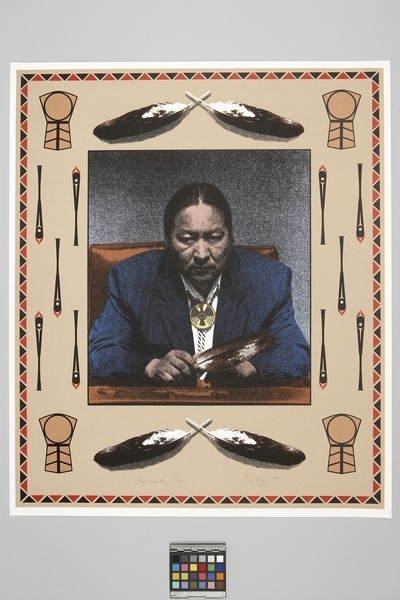Just Say No Item Number: 1507/1 from the MOA: University of British Columbia

Description
Portrait of a seated man at a desk with only the upper body showing. He is wearing a white shirt, a blue jacket, and a yellow, red, and black medallion. His right hand is holding a feather. The background is blue and black. The border has two feathers above and below, five paddles along each side, and a copper at each corner. This in turn, is bordered by alternating red and black triangles. The background is brown. Pencil inscription along the bottom edge reads 'Just Say No 91/135 D. Neel 91'. The print is on a vertically rectangular, white paper piece.
Iconographic Meaning
An eagle feather, as well as a source of strength and connection to the natural world, helps one speak the truth when held. A copper is a traditional symbol of wealth, the four coppers in this print represent the wealth of the country. Wealth may be resources, monetary or cultural. The paddles represent the provinces. In paddling a canoe the pullers all work together, as it is with a country. The two sets of crossed eagle feathers represent the two nations; French-Anglo Canada, and First Nations peoples.
Narrative
The central image is taken from a newspaper photograph by Winnipeg Free Press photographer, Wayne Glowacki of Manitoba MLA Elijah Harper, eagle feather in hand, sitting in the Canadian legislature, saying "no" June 22, 1990 to the Meech Lake constitutional accord. The imagery speaks to a turning point in Canadian history when, for the first time in Canadian history, an Indigenous member of the legislature spoke for the rights of Native Canadians. He spoke against a secret deal made on June 9th, 1990 by 11 first ministers, which would affect untold generations of Canadians. As Canada seeks a path for the future in a constitutional accord, First Nations seek a more active and just role in Canada. This work strives to honour this man and mark a significant event in Canada's history.
Item History
- Made by David Neel (Maker) in British Columbia, Canada during 1991
- Collected during 1991
- Owned by David Neel before February 24, 1992
- Received from Museum of Anthropology Shop Volunteers (Funding source) and David Neel (Seller) on February 24, 1992
What
- Name
- Just Say No
- Identification Number
- 1507/1
- Type of Item
- Overall
- height 66.0 cm, width 55.2 cm, depth 0.1 cm
Who
- Culture
- Kwakwaka'wakw
- Creator
- David Neel (Maker)
- Previous Owner
- David Neel
- Received from
- Museum of Anthropology Shop Volunteers (Funding source) and David Neel (Seller)
Where
- Holding Institution
- MOA: University of British Columbia
- Made in
- British Columbia, Canada
When
- Creation Date
- during 1991
- Collection Date
- during 1991
- Ownership Date
- before February 24, 1992
- Acquisition Date
- on February 24, 1992
Other
- Item Classes
- works on paper
- Condition
- good
- Accession Number
- 1507/0001